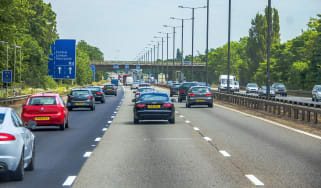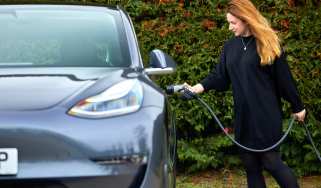Car tax: VED rates and increases explained 2025
Nearly everyone is required to pay road tax to drive a vehicle on the public road – we cover what you need to know

In order to drive a vehicle on the public road in the UK, you’re required to pay Vehicle Excise Duty (VED), otherwise known as car tax. How much you pay depends on a few variables, including the age, emissions and list price of your vehicle, although some drivers and cars are exempt.
When shopping for a new car, it’s important to research how much it’ll cost to tax in order to get a clearer picture of running costs. In this guide, we’ll cover the current VED rates for new cars, as well as the rates for older cars, the luxury car surcharge and classic car tax rules.
We’ve listed annual and six-monthly VED charges for 2024 below. It’s worth noting, however, that if you want to pay on a monthly basis via Direct Debit then you’ll have to pay a small additional fee.
In October 2024, the UK Government announced a series of changes to the VED system in the annual autumn Budget, which were introduced in April 2025. The updates see EVs pay tax for the first time, while some new cars have had their first year VED rate increased by more than £2,000. We’ve covered these changes at the end of this guide.
What is car tax?
Vehicle Excise Duty (VED), commonly referred to as ‘car tax’ or ‘road tax’ is an annual taxation for all vehicles using the public road. It’s quoted as a yearly fee that can be paid once a year, every six months, or on a monthly basis. There are different VED rules based on the age of your car.
Here are the key points to remember:
- All cars registered from 1 April 2017 pay a flat annual VED rate of £195 (this includes hybrid and electric cars).
- Cars registered between 1 March 2001 and 31 March 2017 are taxed based on CO2 emissions.
- Cars registered before 1 March 2001 are taxed based on engine size.
- Brand new cars pay a ‘first year’ VED rate when first registered instead of the flat rate, based on CO2 emissions. The flat annual rate is paid from the second year onwards.
- New cars with a list price of over £40,000 require a VED surcharge for five years, from the second year onwards.
- Historic cars over 40 years old are exempt from VED.
- VED rates usually increase year-on-year with inflation – the flat annual rate will rise in April 2026.
How much is Vehicle Excise Duty (VED) for cars registered after 1 April 2017?
For drivers of petrol, diesel, hybrid and electric cars registered from 1 April 2017, the flat annual rate is currently £195. There is no longer an exemption for electric cars, and alternative fuel vehicles no longer receive a £10 discount.
When buying a new car, this flat rate is paid from the second year onwards. A separate, first-year VED rate applies (see further down this article) but this is accounted for in the car’s ‘on-the-road’ (OTR) price. New cars costing £40,000 or more are liable for a luxury car VED surcharge, explained below.
| Tax class | 12 months | 6 months |
| All cars (petrol, diesel, hybrid and electric) | £195 | £107.25 |
How much is the luxury car tax surcharge?
If you purchase a new vehicle with a ‘list price’ of £40,000 or more, it is classified as a luxury vehicle and commands an additional VED surcharge. This currently stands at £425 for all petrol, diesel, hybrid and electric cars.
As with any new car, the first year VED rate applies (see below). From the second year onwards, the £40,000-plus surcharge is paid on top of the annual flat rate. This is payable for five years from the second year of registration; at six years old, the car reverts to the standard flat rate.
| Annual VED rate including £425 luxury car tax surcharge | 12 months | 6 months |
| All cars (petrol, diesel, hybrid and electric) | £620 | £341 |
What are the first year VED rates 2025?
First year VED rates only apply to those buying a brand new car. It’s a one-off payment based on the vehicle’s CO2 emissions. For most vehicles, it’s higher than the flat annual VED rate, but it’ll be included in the vehicle’s ‘on-the-road’ (OTR) price, along with registration fees, number plates, and delivery costs.
| CO2 emissions | Petrol, RDE2 diesel, hybrid and electric cars |
| g/km CO2 | First year VED rate |
| 0 | £10 |
| 1-50 | £110 |
| 51-75 | £130 |
| 76-90 | £270 |
| 91-100 | £350 |
| 101-110 | £390 |
| 111-130 | £440 |
| 131-150 | £540 |
| 151-170 | £1,360 |
| 171-190 | £2,190 |
| 191-225 | £3,300 |
| 226-255 | £4,680 |
| Over 255 | £5,490 |
What are the VED rates for 2001 to 2017-registered cars?
Cars first registered between 1 March 2001 and 31 March 2017 are taxed according to their CO2 emissions. The system is different for cars registered before this period – we have covered these vehicles further down.
| All cars (petrol, diesel, hybrid and electric) | |||
| Band | g/km CO2 | 12 months | 6 months |
| A | 0-100 | £20 | - |
| B | 101-110 | £20 | - |
| C | 111-120 | £35 | - |
| D | 121-130 | £165 | £90.75 |
| E | 131-140 | £195 | £107.25 |
| F | 141-150 | £215 | £118.25 |
| G | 151-165 | £265 | £145.75 |
| H | 166-175 | £315 | £173.25 |
| I | 176-185 | £345 | £189.75 |
| J | 186-200 | £395 | £217.25 |
| K | 201-225 | £430 | £236.50 |
| L | 226-255 | £735 | £404.25 |
| M | 255+ | £760 | £418 |
What are the VED rates for cars registered before 1 March 2001?
If your car was registered before 1 March 2001, it is taxed according to the size of its engine.
| Engine size (cc) | 12 months | 6 months |
| 1,549 or less | £220 | £121 |
| More than 1,549 | £360 | £198 |
If your car was built before 1 January 1984, it is eligible for ‘historic’ vehicle tax exemption. You must apply for the exemption, which can be done online via the Government website.
If you plan to buy a used car, it’s worth considering its age and VED rate. A car registered in April 2001 could cost twice as much to tax compared to the same car registered in February 2001.
How do I work out how much road tax to pay?
With first year VED rates, annual flat rates and luxury car surcharges to consider, calculating how much road tax you owe can be tricky. Handily, the Vehicle Certification Agency (VCA) has a car tax price checker tool – just enter your car’s CO2 emissions figure, its fuel type and list price and it will calculate how much VED you’re required to pay.
If you’re taxing a used car, the Driver and Vehicle Licensing Agency (DVLA) website allows you to input the car’s registration number to find out its CO2 emissions. If the car was registered between March 2001 and 1 April 2017, you can use this value to work out which band the car belongs to by checking the table above.
If your car was registered before 1 March 2001, you will need to know its engine size. Refer to your car’s handbook for this information, and then use the table above to find out its VED rate.
While business drivers don’t usually have to pay their own road tax, they do need to know about Benefit-in-Kind (BiK) rates. BiK is the reason electric and plug-in hybrid cars are so popular for business users; these are the figures used to calculate company-car tax and we've created a guide to how the system works.
Can I drive without road tax?
No, in most cases, you cannot drive without having paid road tax. Doing so could net you a hefty fine and even result in your vehicle being confiscated by the police. If you’re unsure if your vehicle is taxed, you can check on the DVLA’s website to make sure.
It’s important to remember that VED is not carried over from the previous owner when you buy a used car. The car will have to be taxed immediately before driving it on the public road – there is no ‘grace period’. You can do this by visiting the DVLA website or by phoning the DVLA, ensuring you have the logbook (V5C) or new keeper slip (V5C/2) handy so you can obtain the vehicle’s unique reference number. If you have a car you want to keep in storage and not drive, you can cancel its road tax by making a SORN (Statutory Off-Road Notification), which is valid for 12 months.
What about road tax exemptions?
Aside from drivers with ‘historic’ cars over 40 years old, there are certain scenarios where you may not have to pay VED.
If you are disabled, you may be eligible for a road tax exemption. Visit the Government website to find out specific details and eligibility criteria. The car must be registered in the disabled person’s name or their nominated driver’s name. It’s important to note that this exemption can only be used on one car at a time.
How do I claim a road tax refund?
Under the old tax disc system, a car’s tax could be transferred when it was sold to a new owner. That is no longer the case, as cars are now taxed online.
If you sell a used car before its road tax has expired, you can claim a refund for the remaining tax. You can do this via the DVLA’s website (allow up to six weeks for it to be processed). The buyer of the car must also tax the car immediately before they drive it on the public road.
How do I pay road tax online?
To tax your car online, visit the ‘tax your vehicle’ page on the Government website. You will need a reference number from either your vehicle logbook (V5C), vehicle tax reminder letter (V11) or the green ‘new keeper’ slip if you’ve just purchased a used car. It’s cheapest to pay for a single 12-month payment, although you can pay for six months at a slightly higher rate.
It's possible to pay your road tax with a monthly Direct Debit, though doing so will cost slightly more than paying upfront.
The DVLA automatically sends out renewal reminders (called V11 forms), so remembering to tax your car is easy, despite the fact there are no longer tax discs. V11 forms also have a Direct Debit form to fill in on the back, which you can then take to a Post Office if you’d rather not pay online.
Changes to VED introduced in 2025
In April 2025, the UK Government introduced a series of changes to the VED tax system, designed to increase the incentive towards buying new electric cars. The changes affect zero emission cars, hybrid cars and petrol and diesel cars in different ways, all of which are outlined below. The changes came into effect on April 1st 2025.
The flat annual rate of £190 was increased to £195 in April 2025 for all cars registered after April 2017, in line with inflation. The luxury car surcharge also increased from £410 to £425. Both of these figures are expected to increase again in April 2026 in line with inflation.
Zero emission vehicles
Electric and hydrogen cars were previously exempt from paying all forms of VED, including the first-year rate, the flat annual rate and the luxury car surcharge, but that changed on April 1st 2025. From now on, any zero emissions car registered from 1 April 2017 will pay the standard annual rate of road tax – £195 per year. New zero emissions cars sold from April 1st 2025 incur the lowest rate of VED in the first year (currently £10), rising to the annual flat rate of £195 in the second year.
EVs costing over £40,000 have lost their luxury car surcharge exemption, as well. Owners now have to pay an additional £425 per year from the second year through to the sixth.
Hybrid vehicles
All alternative fuel vehicles, including hybrids, have lost their £10 VED discount as of April 1st 2025. That means that they pay the same £195 flat annual rate from years two through to six as every other car.
First year VED rates have increased, too. Hybrid vehicles in the 1-50g/km CO2 bracket have seen their first year rate rise from £0 to £110, while vehicles in the 51-75g/km CO2 bracket have seen a rise from £20 to £130. All other first-year tax brackets from 76g/km CO2 upwards have been doubled.
Petrol and diesel vehicles
Petrol and diesel cars are still taxed in the same way as before, meaning drivers still pay a first-year rate based on CO2 emissions, the flat annual rate, and the luxury car surcharge if applicable. The annual rate rose to £195 and the luxury car surcharge increased to £425, but the first year rates saw the biggest change.
Every first year VED tax bracket from 76g/km CO2 upwards saw its rate double from April 1st 2025 onwards. That means that a car that emits 120g/km CO2 will now pay £440 in the first year rather than £220. For the highest polluting cars, such as the Ford Mustang which emits around 275g/km CO2, the rate has risen from £2,745 to £5,490.
Frequently Asked Questions
From April 1st 2025, all electric cars in the UK are liable to road tax (VED). They incur a £10 first year VED charge, followed by the standard flat rate of £195. EVs costing over £40,000 are also liable to the expensive car supplement of £425 a year from years two to six.
More on UK car tax...
Recommended

Company car tax 2025: benefit-in-kind (BiK) rates explained

Classic car tax exemption: which historic vehicles qualify?
Most Popular

Suzuki’s new 10-year warranty is free – here’s how to get it

Omoda E5 targets rivals: now with zero deposit and APR
Tips & advice

Car dashboard warning lights: what does each symbol mean?

Electric car charging stations: public networks, charger types, apps and maps









